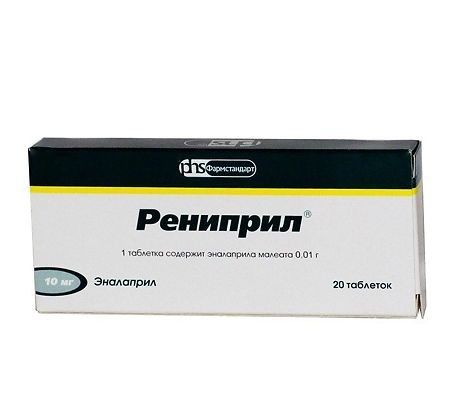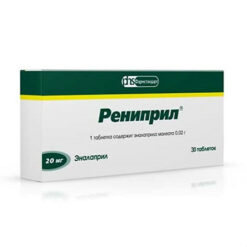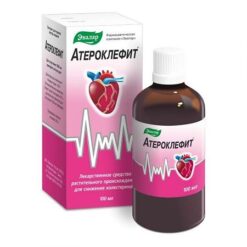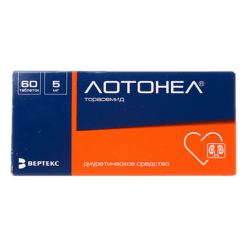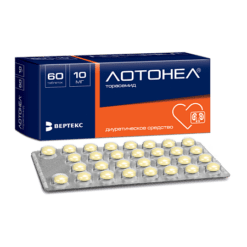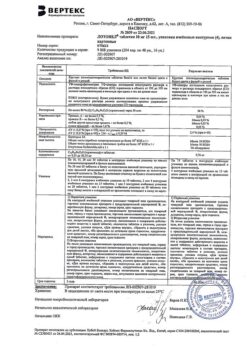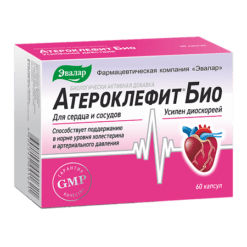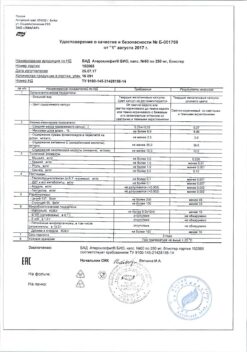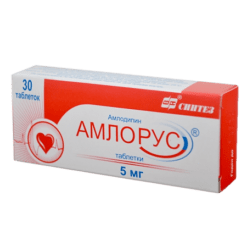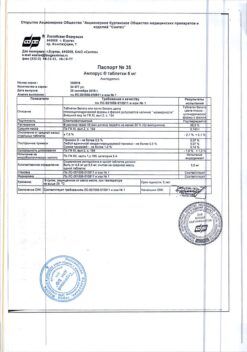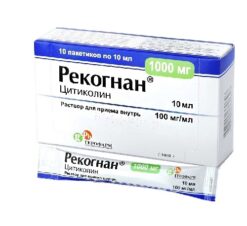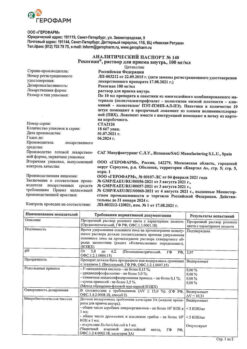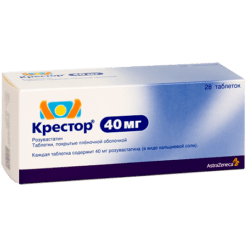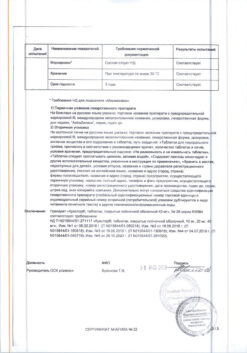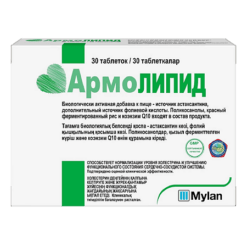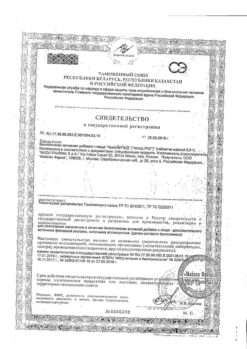No products in the cart.
Renipril, tablets 10 mg 20 pcs
€1.00
Out of stock
(E-mail when Stock is available)
Description
RENIPRIL is an antihypertensive drug, ACE inhibitor.
The mechanism of action of enalapril is associated with inhibition of ACE activity, which reduces the formation of angiotensin II, which contributes to vasoconstriction, and simultaneously activates the formation of kinins and prostacyclin, which have a vasodilator effect.
Enalapril is a prodrug and after its hydrolysis enalapril is formed in the body, which inhibits this enzyme. Enalapril also has some diuretic effect associated with moderate inhibition of aldosterone synthesis.
Along with decreasing BP, the drug decreases pre- and post-load of myocardium in heart failure, improves small circle blood circulation and respiratory function, decreases resistance in renal vessels which promotes normalization of blood circulation in them.
Indications
Indications
– Various forms of arterial hypertension (including renovascular);
– Chronic heart failure (as part of combination therapy).
Active ingredient
Active ingredient
Composition
Composition
1 tablet:
– enalapril maleate 10 mg
excipients:
lactose,
potato starch,
How to take, the dosage
How to take, the dosage
Prescribe orally regardless of the time of meals.
In monotherapy of arterial hypertension, the initial dose is 5 mg once daily.
If there is no clinical effect, the dose is increased by 5 mg after 1-2 weeks. After the initial dose, patients should be under medical supervision for 2 hours and an additional 1 hour until BP stabilizes. If necessary and tolerated well enough, the dose can be increased to 40 mg/day in 2 doses. After 2-3 weeks, switch to a maintenance dose of 10-40 mg/day divided into 1-2 doses. In moderate arterial hypertension, the average daily dose is about 10 mg.
The maximum daily dose of the drug is 40 mg/day.
If prescribed to patients concomitantly receiving diuretics, treatment with a diuretic must be discontinued 2-3 days before administration of Renipril®. If this is not possible, the initial dose of the drug should be 2.5 mg/day.
Patients with hyponatremia (serum concentration of sodium ions less than 130 mmol/l) or serum creatinine concentration more than 0.14 mmol/l have a starting dose of 2.5 mg once daily.
In renovascular hypertension, the initial dose is 2.5-5 mg/day. The maximum daily dose is 20 mg.
In chronic heart failure, the initial dose is 2.5 mg once, then the dose is increased by 2.5-5 mg every 3-4 days according to the clinical response to the maximum tolerated dose depending on BP values, but not more than 40 mg/day once or in 2 doses. Patients with low systolic blood pressure (less than 110 mmHg) should start therapy with a dose of 1.25 mg/day. Dose adjustment should be carried out during 2-4 weeks or in shorter periods. The average maintenance dose is 5-20 mg/day in 1-2 doses.
The elderly are more likely to have a more pronounced hypotensive effect and a longer duration of action of the drug due to decreased elimination rate of enalapril, so the recommended starting dose for the elderly is 1.25 mg.
In chronic renal failure, cumulation occurs when filtration is less than 10 ml/min. With a creatinine clearance (CK) of 80-30 mL/min, the dose is usually 5-10 mg/day, 2.5-5 mg/day for CKs under 30-10 mL/min, and 1.25-2.5 mg/day for CKs under 10 mL/min on dialysis days only.
The duration of treatment depends on the effectiveness of therapy. If BP decreases too significantly, the drug dose is gradually reduced.
The drug is used both in monotherapy and in combination with other antihypertensive agents.
Interaction
Interaction
In concomitant administration of Renipril and NSAIDs may decrease the effectiveness of Renipril; with potassium-saving diuretics (spironolactone, triamterene, amiloride) – possible development of hyperkalemia; with lithium salts – slowing of lithium excretion (monitoring of lithium concentration in blood plasma is indicated).
In concomitant use with analgesics-antipyretics the effectiveness of Renipril may decrease.
Renipril weakens the effect of drugs containing theophylline.
Cimetidine prolongs the effect of Renipril.
Concomitant use of Renipril with diuretics, beta-adrenoblockers, methyldopa, nitrates, calcium channel blockers, hydralazine, prazosin increases hypotensive effect.
Ethanol increases antihypertensive effect of the drug.
Special Instructions
Special Instructions
Caution should be exercised when prescribing Renipril® to patients with decreased circulating blood volume (as a result of diuretic therapy, restriction of table salt intake, hemodialysis, diarrhea and vomiting) – the risk of a sudden and pronounced BP decrease after administration of even the initial dose of ACE inhibitor is increased. Transient hypotension is not a contraindication for continuation of treatment with the drug after BP stabilization. In case of repeated pronounced BP decrease, the dose should be reduced or the drug should be discontinued.
The use of highly permeable dialysis membranes increases the risk of anaphylactic reaction. Adjustment of the dosing regimen on days free of dialysis should be made depending on the BP level.
Before and during treatment with ACE inhibitors, BP, blood parameters (hemoglobin, potassium, creatinine, urea, liver enzymes activity), urine protein should be monitored.
Patients with severe heart failure, coronary heart disease, and cerebrovascular disease in whom a sharp decrease in BP may lead to myocardial infarction, stroke, or impaired renal function should be closely monitored.
Sudden treatment withdrawal does not lead to “withdrawal” syndrome (a sharp rise in BP).
In newborns and infants who have had intrauterine exposure to ACE inhibitors should be closely monitored for the timely detection of marked BP decline, oliguria, hyperkalemia, and neurologic disorders that may result from reduced renal and cerebral blood flow with ACE inhibitor-induced BP decline. In oliguria, it is necessary to maintain BP and renal perfusion by administration of appropriate fluids and vasoconstrictors.
The drug should be discontinued before parathyroid function study.
Alcohol increases the hypotensive effect of the drug.
At the beginning of treatment, until the end of the dosing period, it is necessary to refrain from driving and engaging in potentially hazardous activities requiring increased concentration and rapid psychomotor reactions, as dizziness is possible, especially after taking the initial dose of ACE inhibitor in patients taking diuretics.
Warn the surgeon/anesthesiologist about the use of ACE inhibitors before surgical procedures (including dentistry).
In the presence of renal insufficiency, excretion of the active metabolite may be reduced, resulting in increased plasma concentrations. These patients may require prescribing lower doses of the drug.
In patients with arterial hypertension and unilateral or bilateral renal artery stenosis, serum urea and creatinine may increase.
In such patients, renal function should be monitored during the first few weeks of therapy. Dose reduction of the drug may be necessary.
The relation of risk and potential benefit should be considered when prescribing Renipril® to patients with coronary and cerebrovascular insufficiency because of danger of increasing ischemia with excessive arterial hypotension.
The drug should be administered with caution in patients with diabetes due to the risk of hyperkalemia.
Patients with a history of signs of angioedema may have an increased risk of angioedema during treatment with Renipril®.
Patients with significant autoimmune diseases, such as systemic lupus erythematosus or scleroderma, have an increased risk of developing neutropenia or agranulocytosis while taking Renipril®.
We recommend caution when prescribing Renipril® for therapy of chronic heart failure in patients treated with cardiac glycosides and/or diuretics.
Contraindications
Contraindications
– angioedema associated with the use of ACE inhibitors (in anamnesis);
– progressive azotemia in bilateral renal artery stenosis or artery stenosis of the only kidney;
– childhood under 18 years;
– pregnancy;
– lactation (breastfeeding);
– hypersensitivity to enalapril and other components of the preparation;
– hypersensitivity to other ACE inhibitors.
Side effects
Side effects
Renipril® is generally well tolerated and in most cases does not cause adverse events requiring withdrawal of the drug.
Cardiovascular system disorders: excessive decrease of BP, orthostatic collapse, rarely – chest pain, angina pectoris, myocardial infarction (usually associated with a significant decrease in BP), very rarely – arrhythmias (atrial bradycardia or tachycardia, atrial fibrillation), palpitation, pulmonary artery thromboembolism.
Nervous system disorders: dizziness, fainting, headache, weakness, insomnia, anxiety, confusion, increased fatigue, somnolence (2-3%), very rarely with high doses – nervousness, depression, paresthesia.
Sensory system disorders: vestibular system disorders, hearing and vision disorders, tinnitus.
Gastrointestinal disorders: dry mouth, dyspeptic disorders (nausea, diarrhea or constipation, vomiting, abdominal pain), intestinal obstruction, pancreatitis, disorders of liver function and bile excretion, hepatitis, jaundice.
Respiratory system: non-productive dry cough, interstitial pneumonitis, bronchospasm, dyspnea, rhinorrhea, pharyngitis.
Allergic reactions: skin rash, itching, angioneurotic edema, dysphonia, erythema polymorphic exfoliative dermatitis, Stevens-Johnson syndrome, toxic epidermal necrolysis, pemphigus, photosensitization, serositis, vasculitis, miositis, arthralgia, arthritis, stomatitis, glossitis.
In laboratory tests: hypercreatininemia, increased urea, increased liver enzymes activity, hyperbilirubinemia, hyperkalinemia, hyponatremia. In some cases decrease of hematocrit level, increase of sedimentation rate, thrombocytopenia, neutropenia, agranulocytosis (in patients with autoimmune diseases) and eosinophilia are noted.
Urinary system disorders: impaired renal function, proteinuria.
Others: alopecia, decreased libido, hot flashes.
Overdose
Overdose
Symptoms: arterial hypotension.
Treatment: place patient in elevated position. In mild cases, administer saline solution orally.
In more severe cases, measures aimed at BP stabilization are taken in hospital: intravenous administration of saline solution or plasma substitutes.
Hemodialysis may be used.
Similarities
Similarities
Additional information
| Shelf life | 4 years. Do not use after the expiry date stated on the package. |
|---|---|
| Conditions of storage | Store at a temperature not exceeding 25 oC. Keep out of reach of children. |
| Manufacturer | Pharmstandard-Leksredstva, Russia |
| Medication form | pills |
| Brand | Pharmstandard-Leksredstva |
Other forms…
Related products
Buy Renipril, tablets 10 mg 20 pcs with delivery to USA, UK, Europe and over 120 other countries.

